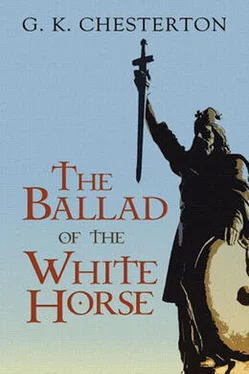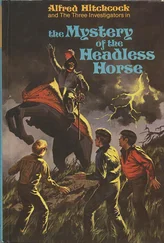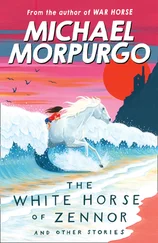A bronzed man, with a bird's bright eye,
And a strong bird's beak and brow,
His skin was brown like buried gold,
And of certain of his sires was told
That they came in the shining ship of old,
With Caesar in the prow.
His fruit trees stood like soldiers
Drilled in a straight line,
His strange, stiff olives did not fail,
And all the kings of the earth drank ale,
But he drank wine.
Wide over wasted British plains
Stood never an arch or dome,
Only the trees to toss and reel,
The tribes to bicker, the beasts to squeal;
But the eyes in his head were strong like steel,
And his soul remembered Rome.
Then Alfred of the lonely spear
Lifted his lion head;
And fronted with the Italian's eye,
Asking him of his whence and why,
King Alfred stood and said:
"I am that oft–defeated King
Whose failure fills the land,
Who fled before the Danes of old,
Who chaffered with the Danes with gold,
Who now upon the Wessex wold
Hardly has feet to stand.
"But out of the mouth of the Mother of God
I have seen the truth like fire,
This—that the sky grows darker yet
And the sea rises higher."
Long looked the Roman on the land;
The trees as golden crowns
Blazed, drenched with dawn and dew–empearled
While faintlier coloured, freshlier curled,
The clouds from underneath the world
Stood up over the downs.
"These vines be ropes that drag me hard,"
He said. "I go not far;
Where would you meet? For you must hold
Half Wiltshire and the White Horse wold,
And the Thames bank to Owsenfold,
If Wessex goes to war.
"Guthrum sits strong on either bank
And you must press his lines
Inwards, and eastward drive him down;
I doubt if you shall take the crown
Till you have taken London town.
For me, I have the vines."
"If each man on the Judgment Day
Meet God on a plain alone,"
Said Alfred, "I will speak for you
As for myself, and call it true
That you brought all fighting folk you knew
Lined under Egbert's Stone.
"Though I be in the dust ere then,
I know where you will be."
And shouldering suddenly his spear
He faded like some elfin fear,
Where the tall pines ran up, tier on tier
Tree overtoppling tree.
He shouldered his spear at morning
And laughed to lay it on,
But he leaned on his spear as on a staff,
With might and little mood to laugh,
Or ever he sighted chick or calf
Of Colan of Caerleon.
For the man dwelt in a lost land
Of boulders and broken men,
In a great grey cave far off to the south
Where a thick green forest stopped the mouth,
Giving darkness in his den.
And the man was come like a shadow,
From the shadow of Druid trees,
Where Usk, with mighty murmurings,
Past Caerleon of the fallen kings,
Goes out to ghostly seas.
Last of a race in ruin—
He spoke the speech of the Gaels;
His kin were in holy Ireland,
Or up in the crags of Wales.
But his soul stood with his mother's folk,
That were of the rain–wrapped isle,
Where Patrick and Brandan westerly
Looked out at last on a landless sea
And the sun's last smile.
His harp was carved and cunning,
As the Celtic craftsman makes,
Graven all over with twisting shapes
Like many headless snakes.
His harp was carved and cunning,
His sword prompt and sharp,
And he was gay when he held the sword,
Sad when he held the harp.
For the great Gaels of Ireland
Are the men that God made mad,
For all their wars are merry,
And all their songs are sad.
He kept the Roman order,
He made the Christian sign;
But his eyes grew often blind and bright,
And the sea that rose in the rocks at night
Rose to his head like wine.
He made the sign of the cross of God,
He knew the Roman prayer,
But he had unreason in his heart
Because of the gods that were.
Even they that walked on the high cliffs,
High as the clouds were then,
Gods of unbearable beauty,
That broke the hearts of men.
And whether in seat or saddle,
Whether with frown or smile,
Whether at feast or fight was he,
He heard the noise of a nameless sea
On an undiscovered isle.
Lifting the great green ivy
And the great spear lowering,
One said, "I am Alfred of Wessex,
And I am a conquered king."
And the man of the cave made answer,
And his eyes were stars of scorn,
"And better kings were conquered
Or ever your sires were born.
"What goddess was your mother,
What fay your breed begot,
That you should not die with Uther
And Arthur and Lancelot?
"But when you win you brag and blow,
And when you lose you rail,
Army of eastland yokels
Not strong enough to fail."
"I bring not boast or railing,"
Spake Alfred not in ire,
"I bring of Our Lady a lesson set,
This—that the sky grows darker yet
And the sea rises higher."
Then Colan of the Sacred Tree
Tossed his black mane on high,
And cried, as rigidly he rose,
"And if the sea and sky be foes,
We will tame the sea and sky."
Smiled Alfred, "Seek ye a fable
More dizzy and more dread
Than all your mad barbarian tales
Where the sky stands on its head?
"A tale where a man looks down on the sky
That has long looked down on him;
A tale where a man can swallow a sea
That might swallow the seraphim.
"Bring to the hut by Egbert's Stone
All bills and bows ye have."
And Alfred strode off rapidly,
And Colan of the Sacred Tree
Went slowly to his cave.
Book III:
The Harp of Alfred
In a tree that yawned and twisted
The King's few goods were flung,
A mass–book mildewed, line by line,
And weapons and a skin of wine,
And an old harp unstrung.
By the yawning tree in the twilight
The King unbound his sword,
Severed the harp of all his goods,
And there in the cool and soundless woods
Sounded a single chord.
Then laughed; and watched the finches flash,
The sullen flies in swarm,
And went unarmed over the hills,
With the harp upon his arm,
Until he came to the White Horse Vale
And saw across the plains,
In the twilight high and far and fell,
Like the fiery terraces of hell,
The camp fires of the Danes—
The fires of the Great Army
That was made of iron men,
Whose lights of sacrilege and scorn
Ran around England red as morn,
Fires over Glastonbury Thorn—
Fires out on Ely Fen.
And as he went by White Horse Vale
He saw lie wan and wide
The old horse graven, God knows when,
By gods or beasts or what things then
Walked a new world instead of men
And scrawled on the hill–side.
And when he came to White Horse Down
The great White Horse was grey,
For it was ill scoured of the weed,
And lichen and thorn could crawl and feed,
Since the foes of settled house and creed
Had swept old works away.
Читать дальше












